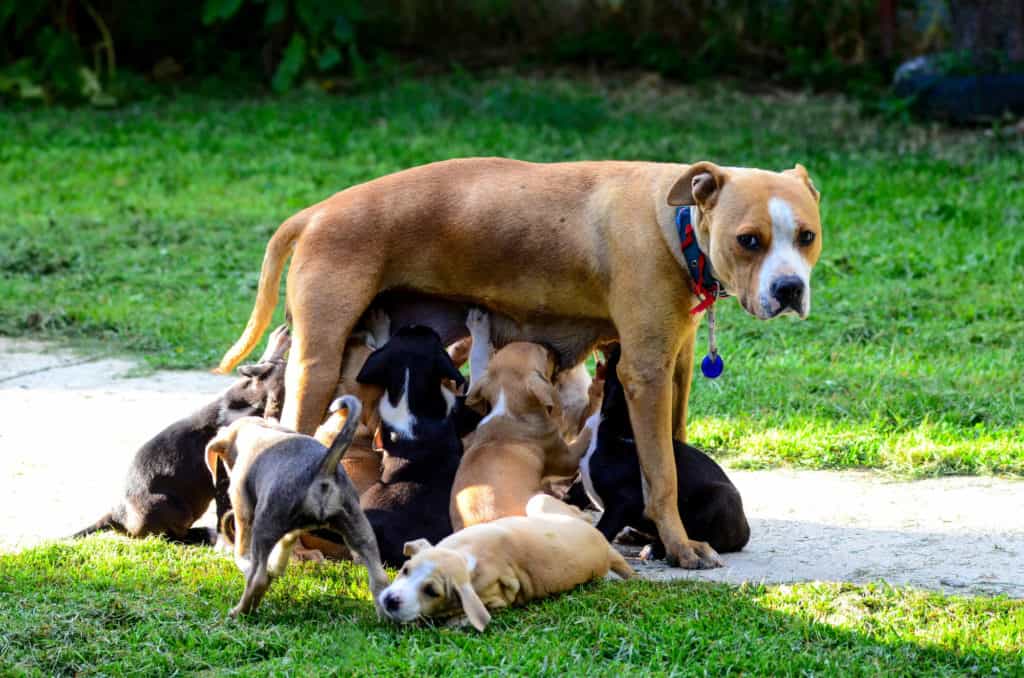Mom can be away from puppies for less than two hours in the first four weeks. By week three, the mother may walk away from their puppies for three or four hours at a time but not more.
As you approach the four-week mark, the mother can leave her puppies for up to six hours at a time. That’s the time when puppies start to eat solid foods and rely less on mom’s milk.
At this point, puppies may survive entirely without having to rely on mom’s milk. However, they’re not ready to be independent yet.
They still need to stay with their mom for around three or four more weeks before they can go on and live their own lives.
But when should that happen? And what if the mother is taken away from her puppies too early? Will they be okay? Will they even survive? We’ll answer all of that, plus some more!

What’s the Best Time to Separate Mom From Puppies?
The best time to separate mom from puppies is between 8–12 weeks. This is when the puppies are physically and mentally developed enough to start being dependent.
Between 8–12 weeks, the puppy’s immune system would’ve developed enough to fight diseases to a reasonable degree.
Additionally, the puppy would’ve taken or is about to take his first vaccination dose.
The puppy’s body would also regulate its own heat and no longer require the mother to keep the puppy warm.
Additionally, this is when the puppy’s personality and temperament start to show.
You should start to build a better relationship with your puppy at that age and let him know that there’s more to the world than just cuddling with mom.
The puppy would also start to get curious and become more independent naturally. When stray dogs give birth, 8–12 weeks is when the puppies start exploring the world away from their mom.
In short, the reasons why it’s best to separate mom from puppies between 8–12 weeks are:
- The puppies developed enough mentally and physically
- The puppies’ personality and temperament start to show
- The puppies get more curious to explore the world
- The 8–12 week mark mimics the natural age of separating from the mother
What Happens if I Separate Mom From Puppies Too Early?
Separating your puppies from their mother too early could lead to various physical and mental problems like:
Helpful Dog Health Resource:
Note: Our Health is #1 Priority. It should be no different for your dog. But you need to help him. The Ultimate Guide to Dog Health is the answer. This handy guide will help you recognize the symptoms of the health problems above. Get the knowledge to stay ahead of these terrible issues that can rob your lovely dog from vigor and life. Help your friend make it to 14 yrs+ without pain and suffering.
Health Risks:
Early separation’s first sign would be the health risks that your puppy may develop. We’ll show you those risks and how to deal with them should it be impossible to have the mother around.
1. Weight Loss

Even if you constantly feed your puppy every two hours, formulas will never be as nutritious as natural breast milk.
Additionally, it’s easier for the puppy’s belly to absorb nutrients from breast milk as they cause fewer digestive issues.
Depending on how far you are from feeding your puppy every two hours, your puppy is at the risk of underdeveloping and losing weight.
2. Diseases
Diseases can happen at any time, but they pose more risk to newborn babies of any species because of the low immunity. A puppy’s immune system may take up to five months before it develops completely.
Until that happens, the puppy relies on the antibodies it gets from the mother’s breast milk.
Body heat regulation is another problem that puppies face if they’re separated from their mother too early. Puppies can’t regulate the heat of their bodies properly until they’re seven months old.
3. Increased Mortality Rate
Puppies whose immune or temperature-regulating systems haven’t developed have a higher mortality risk.
Insufficient food, low immunity, and low temperatures will pose a serious threat to your puppy’s health.
If you can’t do anything about the mother’s absence, do your best to reduce that mortality rate by feeding your puppy regularly. You should also use heat lamps around your puppies to keep them warm.
As for diseases, Additionally, you’ll need regular vet checkups to make sure that everything is okay. Your puppies won’t be able to complain if there’s something physically wrong with them.
Separation Anxiety
Separation anxiety doesn’t only happen to older dogs when their owners aren’t around; it can also happen to puppies when their mother is absent.
Don’t confuse separation anxiety with the crying of your puppies. Puppies will occasionally cry even if their mother is around.
Separation anxiety can manifest itself in puppies (and adults) as aggressive and destructive behaviors.
Make sure to understand and recognize the signs & symptoms of separation anxiety. The earlier you spot those, the easier it will be to handle.
Aggressive Behavior

Your puppies may not have separation anxiety, but early mother separation could lead to aggressive behavior.
Puppies may not be strong enough to turn their aggression into destructive behavior. What they can do, however, is dog food aggression.
Dog food aggression can happen to one or more of your puppies at the same time, especially if they’re many.
You should understand food aggression in puppies and how to deal with it. Detecting the signs and dealing with the problem early on can save you a lot of trouble later on.
Helpful Dog Training Resource:
For help with training your dog, you should take a look at The Online Dog Trainer by Doggy Dan. Doggy Dan is an expert Dog Trainer based in New Zealand. His online resource contains Hundreds of Excellent Dog Training Videos that will take you step-by-step through the process of developing a healthy, happy well-behaved dog.
Barking
Barking is the spoken language of dogs. They’ll bark when they’re happy, sad, lonely, hungry, fearful, or experiencing any emotion.
You’ll have to rely on your puppy’s body language to know if the barking is for a good or a bad reason. Unfortunately, early mother separation leads to barking out of loneliness.
This is especially apparent when even the puppies are separated from each other.
If you can re-unite your puppy with his mother, that would be the optimum course of action. If not, then you should do your best to care for both the physical and mental needs of your puppy.
Keep in mind that even then, your puppy will still bark occasionally for random reasons until you train him to stop barking on command.
Normal barking is a behavior that you shouldn’t worry about. What you’re trying to do is to tone down the excessive, abnormal barking.

Paul has been creating content for the dog niche for many years. The information he shares comes his first hand experience growing up in dog lovers household and then owning multiple dog breeds of his own as an adult. Paul enjoys doing the hard research to collect, analyze and present our dogtemperament.com readers with the best answers to their questions.